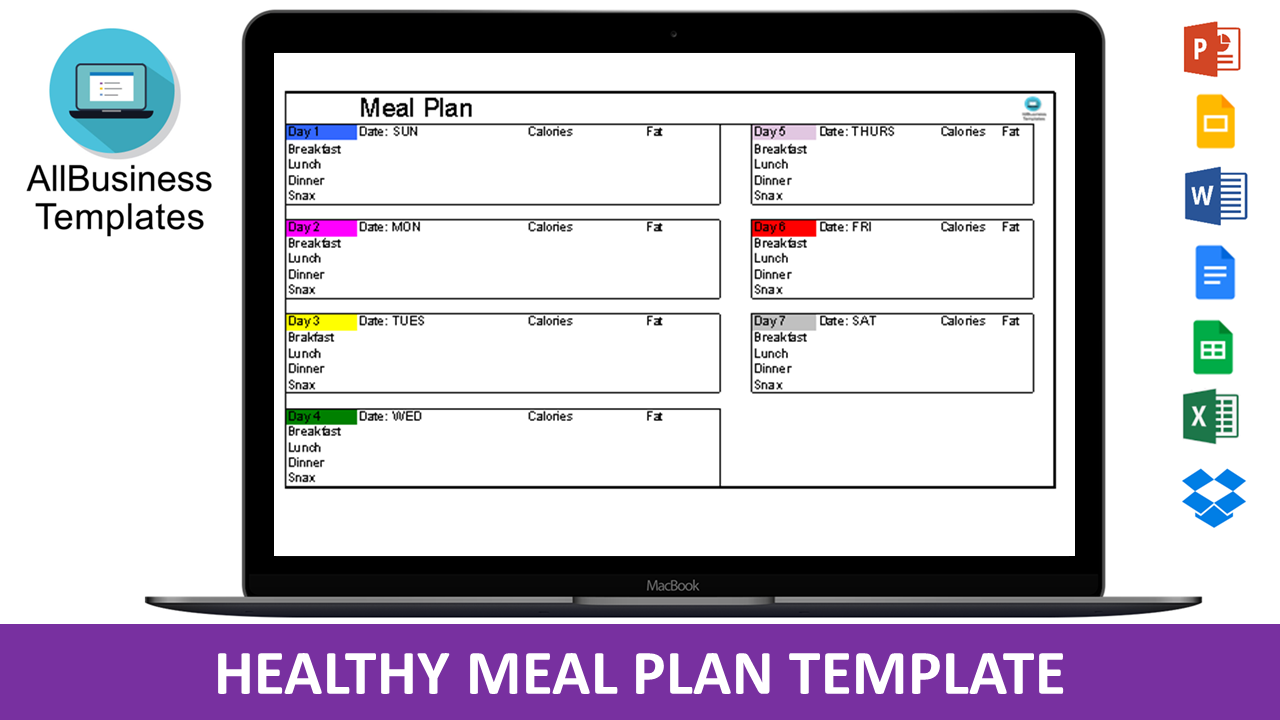Healthy Meal Plan Excel template
Save, fill-In The Blanks, Print, Done!

Download Healthy Meal Plan Excel template
Microsoft Spreadsheet (.xlsx)- This Document Has Been Certified by a Professional
- 100% customizable
- This is a digital download (13.61 kB)
- Language: English
- We recommend downloading this file onto your computer.
How does a healthy meal plan work? Are you looking for a healthy meal plan template in Excel format that you can edit and customize? Our template is the perfect place to start! It includes a comprehensive shopping list and easy-to-follow instructions for preparing meals that are balanced and delicious. Download this sample meal plan template now!
A healthy meal plan is a well-balanced and nutritious eating strategy designed to support overall health, provide essential nutrients, and maintain or achieve a healthy weight. It typically includes a variety of foods from different food groups, with an emphasis on whole, nutrient-dense options. Here are some general guidelines for creating a healthy meal plan:
- Incorporate a Variety of Foods:
- Include a wide range of fruits, vegetables, whole grains, lean proteins, and healthy fats in your diet. This ensures you receive a diverse array of nutrients.
- Balance Macronutrients:
- Aim for a balanced distribution of macronutrients: carbohydrates, proteins, and fats. Each macronutrient plays a crucial role in supporting various bodily functions.
- Portion Control:
- Be mindful of portion sizes to avoid overeating. Use tools like measuring cups or a food scale if needed.
- Choose Whole Grains:
- Opt for whole grains like brown rice, quinoa, whole wheat bread, and oats, which provide more fiber and nutrients compared to refined grains.
- Include Lean Proteins:
- Incorporate lean protein sources such as poultry, fish, tofu, legumes, and beans. Protein is essential for muscle maintenance and repair.
- Healthy Fats:
- Include sources of healthy fats, such as avocados, nuts, seeds, and olive oil. These fats are beneficial for heart health and nutrient absorption.
- Limit Added Sugars:
- Minimize the consumption of foods and beverages high in added sugars. Instead, choose natural sweeteners like fruits.
- Reduce Sodium Intake:
- Limit the intake of processed and high-sodium foods. Use herbs and spices for flavoring instead of excessive salt.
- Hydration:
- Drink plenty of water throughout the day. Limit the consumption of sugary beverages and choose water, herbal teas, or infused water.
- Meal Timing:
- Consider spreading your meals throughout the day to maintain energy levels. Include regular snacks if needed.
- Customize for Dietary Needs:
- Adjust your meal plan based on any dietary restrictions or health conditions you may have. If you have specific nutritional goals, such as weight loss or muscle gain, tailor your meal plan accordingly.
- Meal Prep:
- Plan and prepare meals in advance when possible to make healthier choices more convenient.
Remember, a healthy meal plan should be sustainable and enjoyable. It's essential to find a balance that fits your lifestyle and preferences. Consulting with a registered dietitian or healthcare professional can provide personalized advice based on your individual needs and goals.
Click directly on 'Open with Google Docs' or download our sample healthy meal plan template as a Word template now to enhance efficiency! Your success in delivering a well-structured and effective healthy meal plan awaits.
DISCLAIMER
Nothing on this site shall be considered legal advice and no attorney-client relationship is established.
Leave a Reply. If you have any questions or remarks, feel free to post them below.
Latest templates
Latest topics
- GDPR Compliance Templates
What do you need to become GDPR compliant? Are you looking for useful GDPR document templates to make you compliant? All these compliance documents will be available to download instantly... - Google Docs Templates
How to create documents in Google Docs? We provide Google Docs compatible template and these are the reasons why it's useful to work with Google Docs... - IT Security Standards Kit
What are IT Security Standards? Check out our collection of this newly updated IT Security Kit Standard templates, including policies, controls, processes, checklists, procedures and other documents. - Letter Format
How to format a letter? Here is a brief overview of common letter formats and templates in USA and UK and get inspirited immediately! - Google Sheets Templates
How to work with Google Sheets templates? Where to download useful Google Sheets templates? Check out our samples here.
cheese

